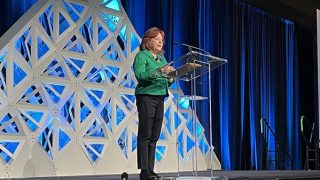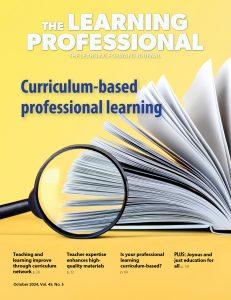WASHINGTON—May 22, 2013— State education leaders should take the lead in efforts to create more coherent, comprehensive, and sustained statewide professional learning systems that help educators at every level meet the promise of the Common Core, according to a new policy brief released today by Learning Forward.
Seizing the Moment: State Lessons for Transforming Professional Learning is a first look at lessons learned through Learning Forward’s ongoing initiative to develop a comprehensive system of professional learning that spans the distance from the statehouse to the classroom.
The initiative, Transforming Professional Learning to Prepare College- and Career-Ready Students: Implementing the Common Core, is supported by Sandler Foundation, the Bill & Melinda Gates Foundation, and MetLife Foundation.
This policy brief underscores the importance of a coordinated state professional learning strategy, the adoption of professional learning standards, the value of assessing the quality of professional development being used, and strategies for leveraging state leadership to drive improvements at the regional and district level.
“We have one tight window of time to ensure that educators have the content knowledge and pedagogical expertise to implement the Common Core,” said Stephanie Hirsh, executive director of Learning Forward. “It’s time for states to seize the moment and eliminate policy incoherence, set standards to codify and measure good professional learning practice, and develop the policy framework to provide sustained, intensive, ongoing, job-embedded professional learning in every school.”
Launched in August 2011, Transforming Professional Learning is led by Learning Forward in partnership with the Kentucky Department of Education and the Council of Chief State School Officers, National Governors’ Association, National Association of State Boards of Education, and the American Association of Colleges for Teacher Education.
As part of the initiative, Kentucky has served as a demonstration state to create a model system of professional learning that directly addresses the Common Core, ensures the standards are used to enable teaching and learning that prepares students for college and careers, is sustainable over time and can be replicated in other states.
Educators in six other states—Georgia, Illinois, New Hampshire, New Jersey, Utah, and Washington—contributed to the development of the system’s tools and strategies as critical friend states.
A state Professional Learning Task Force, comprised of a broad section of education leaders and practitioners, led the initiative’s efforts. The task force recommended a comprehensive professional learning system that includes a vision, definition, and standards for professional learning. The recommendations are expected to be integrated into new legislation and proposed state school board regulation.
The brief includes a discussion of six key policy elements, to be included in legislation or regulations, necessary for transforming traditional approaches of professional development into a comprehensive system of professional learning.
The policy elements are:
- A vision and embedded function of professional learning as a part of education system;
- A definition of professional learning to establish common understanding and practice that blends formal and job-embedded, collaborative professional learning to increase educator effectiveness and student achievement;
- Standards for professional learning to establish quality indicators;
- Ongoing assessment and evaluation with data to measure the quality, effectiveness, and impact of professional learning for accountability and improvement processes; and
- Clearly defined roles and responsibilities of stakeholders, including teachers, principals, and central office staff.
The brief also offers the following lessons for state education leaders:
- Strong leadership starts at the state level and is distributed at all levels of the system.
- The success of professional learning policies that connect directly to the daily professional lives of educators requires educator engagement in their design, implementation, and ongoing refinement.
- States must first build consensus around professional learning policy if they are to sustain current and future education reforms.
- State leaders must work across agencies and departments to establish a coherent policy framework that advances more effective approaches to professional learning.
- Intelligent application of technology increases efficiency, effectiveness and equitable access to professional learning and instructional supports for increased educator effectiveness and student learning.







